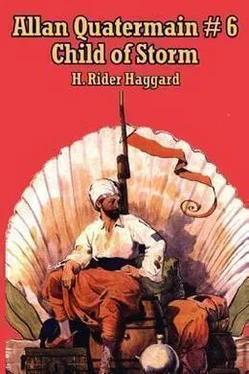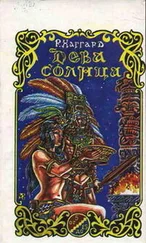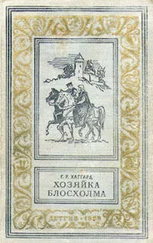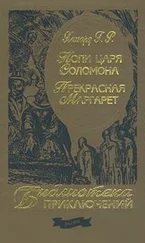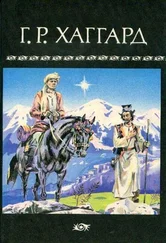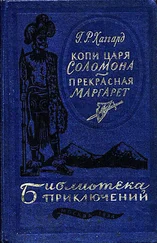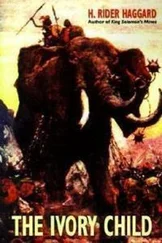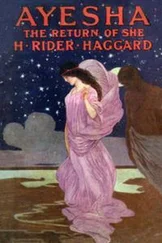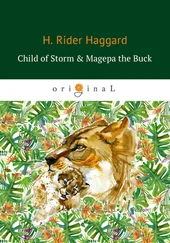Child of Storm
H. Rider Haggard
Dear Mr. Stuart,
For twenty years, I believe I am right in saying, you, as Assistant Secretary for Native Affairs in Natal, and in other offices, have been intimately acquainted with the Zulu people. Moreover, you are one of the few living men who have made a deep and scientific study of their language, their customs and their history. So I confess that I was the more pleased after you were so good as to read this tale—the second book of the epic of the vengeance of Zikali, "the Thing–that–should–never–have–been–born," and of the fall of the House of Senzangakona [1] "Marie" was the first. The third and final act in the drama is yet to come.
—when you wrote to me that it was animated by the true Zulu spirit.
I must admit that my acquaintance with this people dates from a period which closed almost before your day. What I know of them I gathered at the time when Cetewayo, of whom my volume tells, was in his glory, previous to the evil hour in which he found himself driven by the clamour of his regiments, cut off, as they were, through the annexation of the Transvaal, from their hereditary trade of war, to match himself against the British strength. I learned it all by personal observation in the 'seventies, or from the lips of the great Shepstone, my chief and friend, and from my colleagues Osborn, Fynney, Clarke and others, every one of them long since "gone down."
Perhaps it may be as well that this is so, at any rate in the case of one who desires to write of the Zulus as a reigning nation, which now they have ceased to be, and to try to show them as they were, in all their superstitious madness and bloodstained grandeur.
Yet then they had virtues as well as vices. To serve their Country in arms, to die for it and for the King; such was their primitive ideal. If they were fierce they were loyal, and feared neither wounds nor doom; if they listened to the dark redes of the witch–doctor, the trumpet–call of duty sounded still louder in their ears; if, chanting their terrible "Ingoma," at the King's bidding they went forth to slay unsparingly, at least they were not mean or vulgar. From those who continually must face the last great issues of life or death meanness and vulgarity are far removed. These qualities belong to the safe and crowded haunts of civilised men, not to the kraals of Bantu savages, where, at any rate of old, they might be sought in vain.
Now everything is changed, or so I hear, and doubtless in the balance this is best. Still we may wonder what are the thoughts that pass through the mind of some ancient warrior of Chaka's or Dingaan's time, as he suns himself crouched on the ground, for example, where once stood the royal kraal, Duguza, and watches men and women of the Zulu blood passing homeward from the cities or the mines, bemused, some of them, with the white man's smuggled liquor, grotesque with the white man's cast–off garments, hiding, perhaps, in their blankets examples of the white man's doubtful photographs—and then shuts his sunken eyes and remembers the plumed and kilted regiments making that same ground shake as, with a thunder of salute, line upon line, company upon company, they rushed out to battle.
Well, because the latter does not attract me, it is of this former time that I have tried to write—the time of the Impis and the witch–finders and the rival princes of the royal House—as I am glad to learn from you, not quite in vain. Therefore, since you, so great an expert, approve of my labours in the seldom–travelled field of Zulu story, I ask you to allow me to set your name upon this page and subscribe myself,
Gratefully and sincerely yours,
H. RIDER HAGGARD.
Ditchingham, 12th October, 1912.
To James Stuart, Esq., Late Assistant Secretary for Native Affairs, Natal
Mr. Allan Quatermain's story of the wicked and fascinating Mameena, a kind of Zulu Helen, has, it should be stated, a broad foundation in historical fact. Leaving Mameena and her wiles on one side, the tale of the struggle between the Princes Cetewayo and Umbelazi for succession to the throne of Zululand is true.
When the differences between these sons of his became intolerable, because of the tumult which they were causing in his country, King Panda, their father, the son of Senzangakona, and the brother of the great Chaka and of Dingaan, who had ruled before him, did say that "when two young bulls quarrel they had better fight it out." So, at least, I was told by the late Mr. F. B. Fynney, my colleague at the time of the annexation of the Transvaal in 1877, who, as Zulu Border Agent, with the exceptions of the late Sir Theophilus Shepstone and the late Sir Melmoth Osborn, perhaps knew more of that land and people than anyone else of his period.
As a result of this hint given by a maddened king, the great battle of the Tugela was fought at Endondakusuka in December, 1856, between the Usutu party, commanded by Cetewayo, and the adherents of Umbelazi the Handsome, his brother, who was known among the Zulus as "Indhlovu–ene–Sihlonti," or the "Elephant with the tuft of hair," from a little lock of hair which grew low down upon his back.
My friend, Sir Melmoth Osborn, who died in or about the year 1897, was present at this battle, although not as a combatant. Well do I remember his thrilling story, told to me over thirty years ago, of the events of that awful day.
Early in the morning, or during the previous night, I forget which, he swam his horse across the Tugela and hid with it in a bush–clad kopje, blindfolding the animal with his coat lest it should betray him. As it chanced, the great fight of the day, that of the regiment of veterans, which Sir Melmoth informed me Panda had sent down at the last moment to the assistance of Umbelazi, his favourite son, took place almost at the foot of this kopje. Mr. Quatermain, in his narrative, calls this regiment the Amawombe, but my recollection is that the name Sir Melmoth Osborn gave them was "The Greys" or "Upunga."
Whatever their exact title may have been, however, they made a great stand. At least, he told me that when Umbelazi's impi, or army, began to give before the Usutu onslaught, these "Greys" moved forward above 3,000 strong, drawn up in a triple line, and were charged by one of Cetewayo's regiments.
The opposing forces met, and the noise of their clashing shields, said Sir Melmoth, was like the roll of heavy thunder. Then, while he watched, the veteran "Greys" passed over the opposing regiment "as a wave passes over a rock"—these were his exact words—and, leaving about a third of their number dead or wounded among the bodies of the annihilated foe, charged on to meet a second regiment sent against them by Cetewayo. With these the struggle was repeated, but again the "Greys" conquered. Only now there were not more than five or six hundred of them left upon their feet.
These survivors ran to a mound, round which they formed a ring, and here for a long while withstood the attack of a third regiment, until at length they perished almost to a man, buried beneath heaps of their slain assailants, the Usutu.
Truly they made a noble end fighting thus against tremendous odds!
As for the number who fell at this battle of Endondakusuka, Mr. Fynney, in a pamphlet which he wrote, says that six of Umbelazi's brothers died, "whilst it is estimated that upwards of 100,000 of the people—men, women and children—were slain"—a high and indeed an impossible estimate.
That curious personage named John Dunn, an Englishman who became a Zulu chief, and who actually fought in this battle, as narrated by Mr. Quatermain, however, puts the number much lower. What the true total was will never be known; but Sir Melmoth Osborn told me that when he swam his horse back across the Tugela that night it was black with bodies; and Sir Theophilus Shepstone also told me that when he visited the scene a day or two later the banks of the river were strewn with multitudes of them, male and female.
Читать дальше
Конец ознакомительного отрывка
Купить книгу
